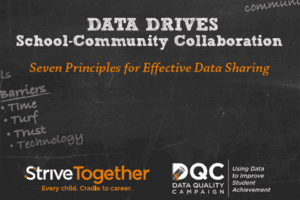This blog is part of a series on seven principles of effective data sharing, including contributions from StriveTogether’s Geoff Zimmerman and DQC’s Chris Kingsley; it was originally posted on the StriveTogether blog. Zimmerman uses the 90% by 2020 initiative as a case study for how strong leaders can facilitate effective dating sharing between school and community organizations to better support student learning.
Strong school and community leaders can create a powerful force for informed collaboration to better support students. The leadership table of the 90% by 2020: Anchorage United for Youth is an example of how a powerful group of leaders can help pave the way data utilization and community-wide commitment to improving education outcomes.
90% by 2020 launched Anchorage’s first community report card last fall. In a recent interview about this key milestone, Senior Director of Education Impact Kameron Perez Verdia told us he learned about a successful approach to community conversations from a local CEO on their leadership team. “His main takeaway was that we need to make it about them and not about us,” Kameron said. “How does this work impact you as a small business owner? How does this work impact you as a parent? How does this work impact you as a teacher or construction worker? He was really thinking about taking the key messages around outcomes and data and utilization of community resources, and making these conversations about the key people he was talking to. That’s where it becomes really powerful.”
Conversations around student data can be extremely challenging. And, many community organizations are unsure how to even begin to develop data sharing partnerships across organizational boundaries. When schools and local community organizations effectively share data, schools can better understand which community partners are serving students and help to align partners and resources. And community organizations have better information on the kids they are serving, which can help improve programming.
StriveTogether and the Data Quality Campaign (DQC) recently released Data Drives School-Community Collaboration: Seven Principles for Effective Data Sharing, a new resource to help communities implement complex data partnerships. A data sharing playbook for community partnerships, this resource contains seven key lessons about how to begin and grow a data-driven initiative with schools and other community partners. It also includes several case examples and resources to help guide communities.
Pave the way with leaders and decision makers is first principle for effective data sharing in the playbook. Decision makers, not data people, get information moving. And they do it when it’s in their own best interest.
Leaders involved in data sharing need to advocate for the use of data for continuous improvement, and for the legality, urgency and value of data sharing for the partnership. And to get there, just like the CEO in Anchorage did, each community needs to build these partnerships by understanding what’s in it for each of them.
It’s in this spirit that we need to pave the way with leaders and decision makers to create the structures for sustained data sharing across sectors. Sustained data sharing is the only way that communities will be able to know what practices are leading to improved outcomes so they can align existing resources to practices that are getting results.


